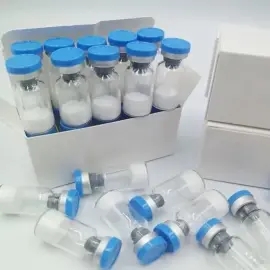Etrap may alleviate thrombocytopenia in patients with low-risk MDS and severe thrombocytopenia
-
Last Update: 2017-02-08
-
Source: Internet
-
Author: User
Search more information of high quality chemicals, good prices and reliable suppliers, visit
www.echemi.com
Myelodysplastic syndromes (MDS) is a group of heterogeneous myeloid clonal diseases originated from hematopoietic stem cells, characterized by myeloid cell dysplasia, manifested as ineffective hematopoiesis and refractory hemocytopenia, while thrombocytopenia is one of the main causes of death of patients, and the current treatment methods are not enough As the first oral thrombopoietin receptor agonist, etrapa was approved by the FDA (http://www.chemdrug.com/article/11/) in November 2008 for the treatment of thrombocytopenia in patients with chronic idiopathic thrombocytopenic purpura after glucocorticoid drugs (http://www.chemdrug.com/), immunoglobulin therapy failure or splenectomy Recently, a phase 2 study, published in the lancet Haematology, was designed to assess whether etrap can alleviate thrombocytopenia in patients with low-risk MDS and severe thrombocytopenia The study was a single blind, randomized, controlled phase 2 trial (http://www.chemdrug.com/sell/24/) that included patients with low-risk or MDS international prognosis score of medium risk-1, platelet count less than 30 × 109, age at least 18 years, refractory to alternative drugs or inapplicable or relapsed after treatment According to 2:1, patients were randomly assigned to the etrap group (50 mg to 300 mg) or placebo group for at least 24 weeks or until the disease progressed The primary end point of phase 1 of the study was the proportion of patients who achieved thrombocytopenia within 24 weeks of treatment and safety 90 patients were included in the first phase of the study, with a median follow-up period of 11 weeks Thrombocytopenia occurred in 28 / 59 (47%) of patients in the etrapa group and 1 / 31 (3%) of patients in the placebo group During the follow-up period, 21 patients had at least one serious bleeding event (who bleeding score ≥ 2), and the proportion of bleeding patients in placebo group was much higher than that in etrap group (42% vs 14%) 27 (46%) of the patients in etrapa group had 52 grade 3-4 adverse reactions, while 5 (16%) of the patients in placebo group had 9 adverse events; 7 / 59 (12%) of the patients had acute myeloid leukemia transformation or disease progression and 5 / 31 (16%) of the patients in placebo group This study showed that, for patients with low-risk MDS and severe thrombocytopenia, etrapa effectively increased platelet count, reduced the incidence of bleeding events, and had good tolerance The second phase of the study is currently under way to assess the long-term safety and efficacy of etrap and its impact on patient survival.
This article is an English version of an article which is originally in the Chinese language on echemi.com and is provided for information purposes only.
This website makes no representation or warranty of any kind, either expressed or implied, as to the accuracy, completeness ownership or reliability of
the article or any translations thereof. If you have any concerns or complaints relating to the article, please send an email, providing a detailed
description of the concern or complaint, to
service@echemi.com. A staff member will contact you within 5 working days. Once verified, infringing content
will be removed immediately.







